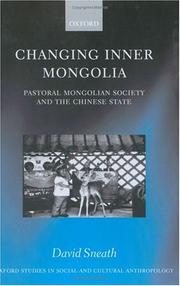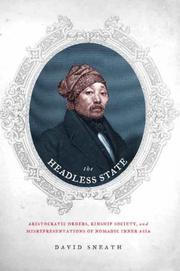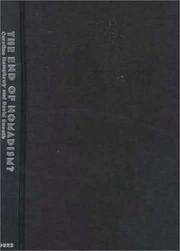| Listing 1 - 10 of 14 | << page >> |
Sort by
|

ISBN: 9780198234135 0198234139 Year: 2000 Publisher: Oxford : Oxford University Press,
Abstract | Keywords | Export | Availability | Bookmark
 Loading...
Loading...Choose an application
- Reference Manager
- EndNote
- RefWorks (Direct export to RefWorks)
Pastoral systems --- Pastoralisme --- Inner Mongolia (China) --- Mongolie-Intérieure (Chine) --- History. --- Social conditions. --- Histoire --- Conditions sociales --- Mongolie-Intérieure (Chine)

ISBN: 9780231140546 0231140541 9780231511674 0231511671 Year: 2007 Publisher: New York, NY
Abstract | Keywords | Export | Availability | Bookmark
 Loading...
Loading...Choose an application
- Reference Manager
- EndNote
- RefWorks (Direct export to RefWorks)
In this groundbreaking work, social anthropologist David Sneath aggressively dispels the myths surrounding the history of steppe societies and proposes a new understanding of the nature and formation of the state. Since the colonial era, representations of Inner Asia have been dominated by images of fierce nomads organized into clans and tribes-but as Sneath reveals, these representations have no sound basis in historical fact. Rather, they are the product of nineteenth-century evolutionist social theory, which saw kinship as the organizing principle in a nonstate society.Sneath argues that aristocratic power and statelike processes of administration were the true organizers of life on the steppe. Rethinking the traditional dichotomy between state and nonstate societies, Sneath conceives of a "headless state" in which a configuration of statelike power was formed by the horizontal relations among power holders and was reproduced with or without an overarching ruler or central "head." In other words, almost all of the operations of state power existed at the local level, virtually independent of central bureaucratic authority. Sneath's research gives rise to an alternative picture of steppe life in which aristocrats determined the size, scale, and degree of centralization of political power. His history of the region shows no clear distinction between a highly centralized, stratified "state" society and an egalitarian, kin-based "tribal" society. Drawing on his extensive anthropological fieldwork in the region, Sneath persuasively challenges the legitimacy of the tribal model, which continues to distort scholarship on the history of Inner Asia.
Tribal government --- Clans --- Power (Social sciences) --- Aristocracy (Political science) --- Gouvernement tribal --- Pouvoir (Sciences sociales) --- Aristocratie (Science politique) --- Asia, Central --- Asie centrale --- Politics and government --- Politique et gouvernement --- Political science --- Tribes --- Empowerment (Social sciences) --- Political power --- Exchange theory (Sociology) --- Social sciences --- Sociology --- Consensus (Social sciences) --- Clans and clan system --- Sibs --- Families --- Kinship --- Aristocracy
Book
ISBN: 9048542138 9789048542130 9462989567 9789462989566 Year: 2018 Publisher: Amsterdam : Amsterdam University Press,
Abstract | Keywords | Export | Availability | Bookmark
 Loading...
Loading...Choose an application
- Reference Manager
- EndNote
- RefWorks (Direct export to RefWorks)
This book explores the historical and contemporary processes that have made and remade Mongolia as it is today: the construction of ethnic and national cultures, the transformations of political economy and a 'nomadic' pastoralism, and the revitalization of a religious and cosmological heritage that has led to new forms of post-socialist politics. Widely published as an expert in the field, David Sneath offers a fresh perspective into a region often seen as mysterious to the West.
HISTORY / General. --- Mongolia --- Politics and government --- Economic conditions. --- Cosmopolitanism --- Mongols --- Political science --- Internationalism --- Social life and customs. --- Politics and government |y 1992 --- -Economic conditions. --- Mongġol --- 몽골 --- Mongol Uls --- Монгол Улс --- Mongġol Ulus --- Mongolie --- Mongolii︠a︡ --- Монголия --- Mongolei --- BNMAU --- БНМАУ --- Bu̇gd Naĭramdakh Mongol Ard Uls --- Bügd Nayramdah Mongol Ard Uls --- MNR --- МНР --- Mongolʹskai︠a︡ narodnai︠a︡ respublika --- Монгольская народная республика --- Meng-ku jen min kung ho kuo --- Menggu ren min gong he guo --- 蒙古人民共和國 --- Meng-ku --- Menggu --- 蒙古 --- Wai Meng-ku --- Mongolische Volksrepublik --- Mongoru Jimmin Kyōwakoku --- Mongol Népköztársaság --- Outer Mongolia --- Mongolia (Outer Mongolia) --- Mongolian People's Republic --- Mongolia (Mongolian People's Republic) --- République populaire de Mongolie --- Bu̇gd Naĭramdakh Mongol Ard Ulsyn --- Mongolian Republic --- Mongoliet --- モンゴル --- Mongoru --- 外蒙古 --- Gaimōko --- 蒙古人民共和国 --- Mōko Jinmin Kyōwakoku --- モンゴル人民共和国 --- Mongoru Jinmin Kyōwakoku --- Inner Mongolia (China) --- Bu̇gu̇de Nayiramdaqu Mongġol Arad Ulus --- Mengguguo --- 蒙古国 --- Wai Menggu
Digital
ISBN: 9789048542130 Year: 2018 Publisher: Amsterdam Amsterdam University Press
Abstract | Keywords | Export | Availability | Bookmark
 Loading...
Loading...Choose an application
- Reference Manager
- EndNote
- RefWorks (Direct export to RefWorks)

ISBN: 9780231511674 9780231140546 Year: 2007 Publisher: New York, N.Y. Columbia University Press
Abstract | Keywords | Export | Availability | Bookmark
 Loading...
Loading...Choose an application
- Reference Manager
- EndNote
- RefWorks (Direct export to RefWorks)
Digital
ISBN: 9789048542130 9789462989566 Year: 2018 Publisher: Amsterdam Amsterdam University Press
Abstract | Keywords | Export | Availability | Bookmark
 Loading...
Loading...Choose an application
- Reference Manager
- EndNote
- RefWorks (Direct export to RefWorks)
Book
ISBN: 1283851784 9004216359 9789004216358 9781905246366 1905246366 9781283851787 Year: 2010 Publisher: Folkestone Global Oriental
Abstract | Keywords | Export | Availability | Bookmark
 Loading...
Loading...Choose an application
- Reference Manager
- EndNote
- RefWorks (Direct export to RefWorks)
A significant aspect of this work is the emphasis on source materials, including some translated from Mongolian and other languages for the first time. The source materials and other articles are all fully contextualized and situated by introductory material by the volume’s editors. This is the first work in English to bring together significant articles in Mongolian studies in one place, which will be widely welcomed by scholars and researchers in this field. This essential reference in two volumes includes works by noted scholars including Charles Bawden, Igor de Rachewiltz, David Morgan, Owen Lattimore and Caroline Humphrey. It also includes excerpts from translations of source documents, such as the works of Rashid al-Din, The Secret History of the Mongols and the Yuan Shih . In addition, more recent historical periods are covered, with material such as Batmonh’s speech that heralded Mongolia’s versions of glasnost and perestroika, as well as Baabar’s Buu Mart, a key work associated with the Democratic Revolution of 1990.
Mongolia --- History. --- Geschichte

ISBN: 0822321408 Year: 1999 Publisher: Durham Duke university press
Abstract | Keywords | Export | Availability | Bookmark
 Loading...
Loading...Choose an application
- Reference Manager
- EndNote
- RefWorks (Direct export to RefWorks)
Human ecology --- Nomads --- Pastoral systems --- Asia, Central --- Environmental conditions. --- Ethnic relations. --- Politics and government.
Multi

ISBN: 9781785338892 Year: 2018 Publisher: New York; ; Oxford Berghahn Books
Abstract | Keywords | Export | Availability | Bookmark
 Loading...
Loading...Choose an application
- Reference Manager
- EndNote
- RefWorks (Direct export to RefWorks)
Multi

ISBN: 9781845458836 Year: 2008 Publisher: New York; ; Oxford Berghahn Books
Abstract | Keywords | Export | Availability | Bookmark
 Loading...
Loading...Choose an application
- Reference Manager
- EndNote
- RefWorks (Direct export to RefWorks)
| Listing 1 - 10 of 14 | << page >> |
Sort by
|

 Search
Search Feedback
Feedback About UniCat
About UniCat  Help
Help News
News